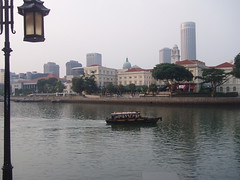
The question of immigrants and immigration was recently a hot topic in Singapore. The island state needs immigrants to supplant its declining population.
Japan is another example but it can't take a recourse like Singapore. Singapore is unique in the region. Like the United States, it is a multicultural society, built with the blood and sweat of immigrants.
In our time, when the world's economies are integrating globally, we are seeing immigration happening on a large scale all over the world.
People are crossing borders in hordes, legally or illegally. Educated youths, generally holders of a Master's degree in business administration, engineers or computer experts from poor countries, and even semi-skilled workers are emigrating to richer countries.
And the rich countries welcome them with open arms for their skills.
But there are also some unpleasant, unwelcome guests.
The British are worried, for example, about workers from Eastern Europe inundating their labour markets. America had to put up a fence and recruit troops to patrol its border with Mexico. Spain's Canary Island is awash with illegal immigrants from Africa.
The core question remains: Why do people immigrate?
The question has vexed me for a long time. Even as a child in a nondescript village in India, I would wonder about this.
Then, my imagination was bound within the territories of my country, India. I would see fellow village folk, short of work, going off to Kolkata and Delhi to work in the mills. Others went to faraway Punjab to work for rich farmers benefiting from a green revolution in India in the 1970s.
Economics was the only reason that could explain this flight of able hands from my village to the big cities or richer places. Places from where village folk could send money to feed the hungry mouths at home.
Years later, I went to Delhi to pursue higher studies. But what did I see? Many of my better-off friends, born and brought up in metros such as Delhi, wanted to go to the United Kingdom, the US or Australia.
After getting their degrees, some went away to the rich countries as foreign students, never to return to India. Universities were their entry points to the workforce of those rich countries.
Later, when I joined the Delhi workforce, I saw many colleagues migrate to Western countries. They never returned.
People from villages and small towns who went to the big cities such as Delhi or Mumbai considered them good enough to find success in, and their parents felt proud of their children's achievements. After all, to find a toehold in a metro within a country of 1 billion people was no mean achievement for most of us.
What about those who seemingly had no complaints; why did they need to migrate?
I guess they had different parameters for success. For many from South India, for example, it became almost a competitive trend to send their sons and daughters to the US or Europe, either to work or study.
THEN I came to Singapore, and found to my dismay that some Singaporeans were also leaving their country.
Why? Over the centuries, this age-old question has vexed many hearts and souls, not just mine.
Let me take you to Russia, to 1869. To the fictional world set by Nobel Prize-winner novelist J M Coetzee in The Master of Petersburg.
The novel's protagonist, an old Dostoevsky (yes, the famous Russian novelist) is summoned from Germany to St Petersburg by the sudden death of his stepson, Pavel. He visits the place where Pavel lodged and muses about his stepson's desire to go to France.
In a discussion with the landlady, the ageing novelist comments: "When you are young, you are impatient with everything around you. You are impatient with your motherland because your motherland seems old and stale to you.
"You want new sights, new ideas. You think that in France or Germany or England, you will find the future that your own country is too dull to provide you with."
Perhaps, now, I vaguely know the reason why people migrate.
Migration appears to be basically a question of survival. But it is not that simple.
On another level, it is also a matter of aspiration. The desire to achieve or to prove something.
There may be hundreds of reasons but one thing is for sure: It is not about money and comfort all the time.
Published in Today, dt Sep 13, 2006.



